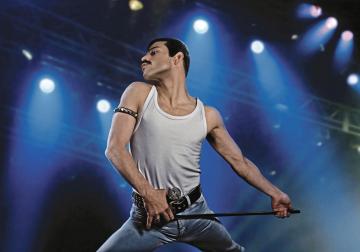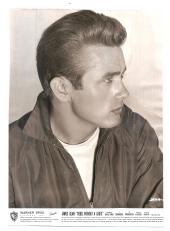Malek dazzles as Mercury in 'Bohemian Rhapsody'
“Fortune favors the bold” was a motivational mantra for Freddie Mercury. It favored him and the legendary band Queen for a decade, then abandoned him at his peak. But it never abandoned their music, as this new biopic — fueled by the dazzling performance of Rami Malek — demonstrates.
“Bohemian Rhapsody” traces the meteoric rise (there was no fall) of Queen’s lush, revolutionary sound and a lead singer, whose stage charisma and astonishing four-octave range made him one of the 20th century’s most beloved rock stars.
Quintessentially British, right? Wrong. Freddie was Farrokh Bulsara, born in Zanzibar and raised in India before the family moved to London when he was 17. There he eventually joins up with drummer Roger Taylor (Ben Hardy), bassist John Deacon (Joseph Mazzello) and Brian May (Gwilym Lee), who introduces him to sweet Mary Austin (Lucy Boynton) — Mercury’s longtime Venus, for whom he composes the beautiful “Love of My Life” ballad.
Artistic struggles, personal rivalries, modest successes ensue — and then comes Queen’s landmark 1975 album “A Night at the Opera,” which had nothing much to do with the Marx Brothers beyond the name. After a violent hard-rock opening “Death on Two Legs,” it moves right along to the delicious ditties “Lazing on a Sunday Afternoon” and “Seaside Rendezvous,” then Mr. Taylor’s nasty-funny “I’m in Love With My Car”:
Told my girl I have to forget her
Rather buy me a new carburetor…
- Starring: Rami Malek, Lucy Boynton, Gwilym Lee, Ben Hardy, Mike Myers.
- Rating: PG-13 for thematic elements, suggestive material, drug content and language.
Postponed to penultimate spot on the flip side is the masterpiece, “Bohemian Rhapsody,” Mercury’s miniature “mock opera” — a rock suite with extravagant multitrack choral verses, alternating with guitar and vocal “arias” in a dizzy “libretto” that trades conventional sex-love themes for a harrowing tale of murder and damnation.
It blends shifting rock styles — hard, soft, progressive — with symphonic instrumentation then in vogue with such British bands as Yes and Emerson Lake & Palmer. Those disparate elements and the band’s exquisite harmonies were all somehow unified by Freddie’s ethereal voice, equally comfortable from Johnny Cash growl to Tiny Tim coloratura.
That voice, then and always, was angelic. But the lyrics were diabolic:
Mama, just killed a man — put a gun against his head, pulled my trigger, now he’s dead…
Beelzebub has a devil put aside for me… Thunderbolt and lightning, very very frightening ME! …Bismillah [in the name of God]! We will not let you go!… Mama mia!… I don’t wanna die…
Finally arriving at the deceptively soft conclusion: Nothing really matters to me.
Esoteric epic poem, or pseudo-operatic nonsense? Perhaps both. A saga of alienation and rejection that Freddie always steadfastly refused to explicate.
It took three weeks to record, some sections requiring as many as 180 overdubs. Since studios then had only 24-track analog tape, the overdubs had to be “bounced” down to successive sub-mixes, which then had to be spliced together (by hand) in proper sequence. No synthesizers were used to achieve any effects. It was a groundbreaking work of art, in every sense, but — “It goes on forever, six bloody minutes!” squeals their backer Ray Foster (Mike Myers) — nobody will give it radio play.
Freddie’s immortal reply: “I pity your wife if you think six minutes is forever.”
[For insight into Freddie Mercury’s opera influences — he especially loved Bizet’s “Carmen” and Puccini’s works — readers are urged to watch the YouTube title track of his great solo album “Barcelona,” a collaboration with his diva-idol Montserrat Caballe, who passed away just three weeks ago.]
The Rhapsody’s brilliant 1975 promotional video — hailed as begetting MTV and the whole explosive music video age — helped solve that problem.
Anthony McCarten’s screenplay covers Mercury’s bitter break with Queen to pursue a solo career but offers only chaste suggestions — precious little substance — on the subject of his bisexuality. He reunites grandly with the band at Wembley Stadium in London in 1985 for concert to benefit African famine victims. It was the biggest live satellite link/TV broadcast of all time, with a global audience of 1.9 billion — and Mercury gave one of the greatest performances in rock history.
Director Bryan Singer (who was fired two weeks before the end of production, replaced by Dexter Fletcher) does a terrific job in the photographic “making” of the Rhapsody studio and LiveAid concert scenes, atoning to some extent for the LGBT short shrift. Mercury himself would likely have approved: His HIV diagnosis, a year after LiveAid, is a terrible death sentence, but he says, “I’m gonna go out performing, not being the poster boy for AIDS.”
FYI, the original choice to play Freddie was Sacha Baron Cohen, who left the project due to the proverbial “creative differences” with its producers — thankfully. He would’ve camped it up, a la “Bruno.” Rami Malek, the Emmy-decorated star of TV’s “Mr. Robot,” is quite perfect with his Egyptian heritage and (falsely) protrusive front teeth. At first he seems like a more punkish than Puckish Mick Jagger, but his portrayal gets better and deeper as it progresses, aided by the fine support of Mr. Lee as “straight” Brian, Mr. Hardy as blond-bombshell Roger and Mr. Mazzello as quiet John.
Were they truly a collective genius Fab Four like the Beatles or, as someone says, “just four misfits who don’t really belong together” — Led Zeppelin wannabes?
Professional sports have them to thank for “We Will Rock You.” Rap, hip-hop and disco-soul owe them a debt for the funk bass and rhythmic vocals of “Another One Bites the Dust” — the seminal anti-gun violence anthem that’s now more relevant than ever.
“I’m exactly the person I was always meant to be,” says Freddie, to the fullest regal and sexual extent of his band’s cheeky name. But all the Queen’s men couldn’t put him back together again after the plague struck him. With its stigma at a peak, he didn’t acknowledge the disease until the day before he died, at 45, in 1991. His historic contribution to AIDS awareness would come from being the first great artist-victim of its unawareness.
This powerful “Rhapsody,” 10 years in the making, is really more Queen than Freddie — a spectacle of joyful and electrifying rock ‘n’ roll. But Mercury rises in Mr. Malek’s stellar portrayal, demonstrating how much both his voice and his music still matter to the world.
Post-Gazette film critic emeritus Barry Paris: parispg48@aol.com.







